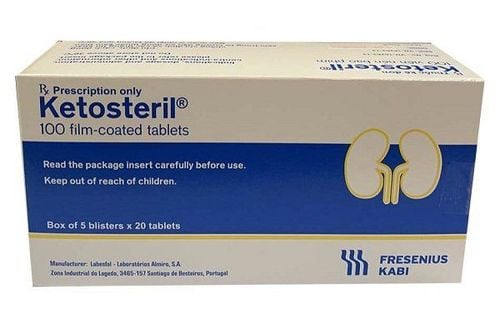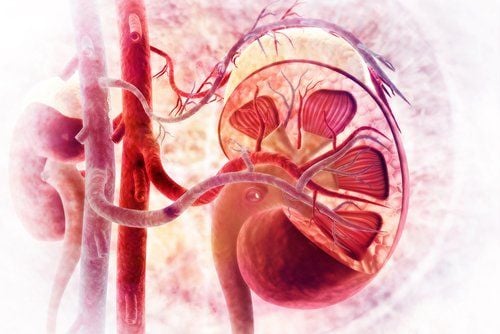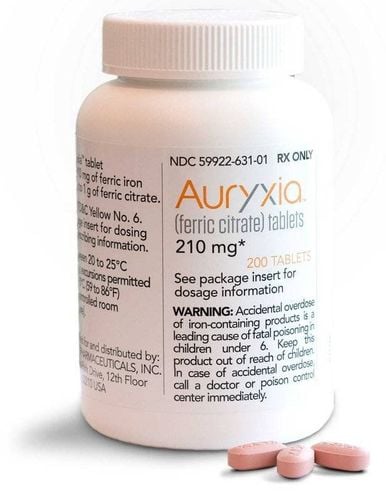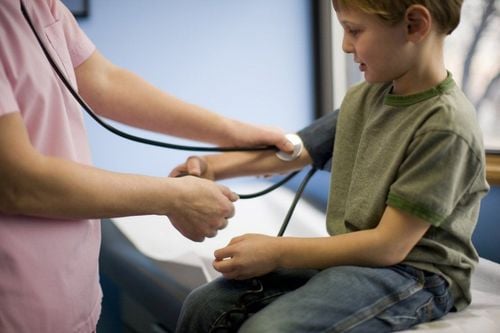This is an automatically translated article.
Chronic kidney disease is a condition in which kidney function declines which can be caused by many different causes. Although chronic kidney failure cannot be cured, if it is well controlled, you can live long with the disease.
1. What is chronic kidney disease?
Chronic kidney disease (CKD) is a condition in which damage to the kidneys causes impaired, irreversible function. Since then the kidneys cannot perform the function of eliminating toxins in the body and excess fluid from the blood; acid-alkali balance in the blood; erythropoietic function; mineral balance in the body.
Chronic kidney failure often arises from acute kidney disease, which is untreated or does not improve after 3 months.
Some possible causes of chronic kidney disease include:
Diabetes, high blood pressure are 2 common causes of chronic kidney disease; Acute glomerulonephritis, interstitial nephritis, nephritis and inflammation of surrounding structures; Polycystic kidney disease ; Persistent urinary tract obstruction as seen in prostate enlargement, kidney stones, and some cancers; Vesicoureteral Reflux (VUR): This is a condition that causes urine to flow back into the kidneys; Nephritis, pyelonephritis recurrence; Factors that increase the risk of chronic kidney disease include overweight, obesity, smoking, dyslipidemia... When you have chronic kidney disease, you may not have clear symptoms in the early stages. head. The later stages may experience some symptoms such as fatigue, nausea, urinating more or less than usual, edema, weight loss, loss of appetite, dark urine, rash, increased blood pressure ..
.
2. How to live with chronic kidney disease?
Proper functioning of the kidneys is vital to keeping your health. If you have chronic kidney disease, your blood's filtration won't be as good as it should be and this can lead to other health problems. Although kidney damage cannot be reversed, steps can be taken to make it progress more slowly. Here are some ways to help you live with chronic kidney disease:
Plan your medication as prescribed Some medications are used to prevent future serious problems. It is very important that you take the correct medicine prescribed for your illness, even if you already feel well.
In addition, some drugs can affect kidney function or have a risk of drug accumulation when taken. Always read the instructions carefully and consult your doctor before taking any medication. Including pain relievers, supplements or nutritional supplements.
Be physically active Physical activity is great for anyone, including those with kidney disease. It can boost energy, help you sleep better, strengthen bones, and stave off depression. It may also reduce the risk of other problems such as cardiovascular disease.
If you have mild to moderate chronic kidney disease, you should be able to be as physically active as normal people. If you have late-stage (or severe) chronic kidney disease, you can quickly become more tired when you're physically active. So you need to talk to your doctor about which physical activity is right for you.
Diet A healthy, balanced diet can help improve your health and reduce your risk of developing other problems with chronic kidney disease.
Although salt should be limited in the diet, your food doesn't have to be bland. You can create your own dishes with herbs, spices, and flavored vinegar in your favorite recipes. Cooking food at home instead of eating out at a restaurant is also a way to help you reduce the amount of salt you eat and control what you are eating.
If you have diabetes and chronic kidney disease at the same time, finding the best foods to eat can be difficult. But that doesn't mean it's impossible, as there are still plenty of foods you can enjoy that are delicious. Some foods that work for both diabetes and chronic kidney disease include: Berries (grapes, cherries, apples, plums...); vegetables (cabbage, cauliflower, onion, eggplant, radish...); Protein (lean meats such as poultry, fish, eggs, unsalted seafood; starches (white bread, bagels, unsalted crackers, pasta, rice); beverages (water, tea); no sugar, unsweetened milk); avoid processed foods, sugar, cakes, sweets, soft drinks, carbonated water...
Focus on your sleep Sleep is very important to have stable health. You should get enough sleep, get proper rest. Create a quiet environment for better sleep, avoid mental stress, relax before sleeping...
Relax You can practicing relaxation methods such as meditation, yoga...These help you relieve the pressure in your daily life and also help your body become healthier.
Some other methods you can do to stay healthy with your chronic kidney disease:
Quit or best not start: Smoking can make kidney disease worse and interfere with medicines that lower blood pressure; Limit drinking: Because alcohol can be m increased risk of experiencing high blood pressure; Keep your blood pressure below 140/90 mmHg or your own goal blood pressure set by your doctor; If you have diabetes, keep your blood sugar on target.; During flu season you should get a flu shot. Recognizing abnormal signs:
If you feel a lot of fatigue, do not urinate, dizziness, vomiting a lot, bleeding does not stop, coma... the patient should be taken to a medical facility for examination and treatment. timely treatment; In addition, regular check-ups as prescribed by your doctor are also very important. This helps to detect early if the condition is getting worse. Here's what you need to do to help yourself live a healthy life with chronic kidney disease. If the disease is severe or unusual, you should see another doctor right away.
Please dial HOTLINE for more information or register for an appointment HERE. Download MyVinmec app to make appointments faster and to manage your bookings easily.
Reference source: healthline.com













